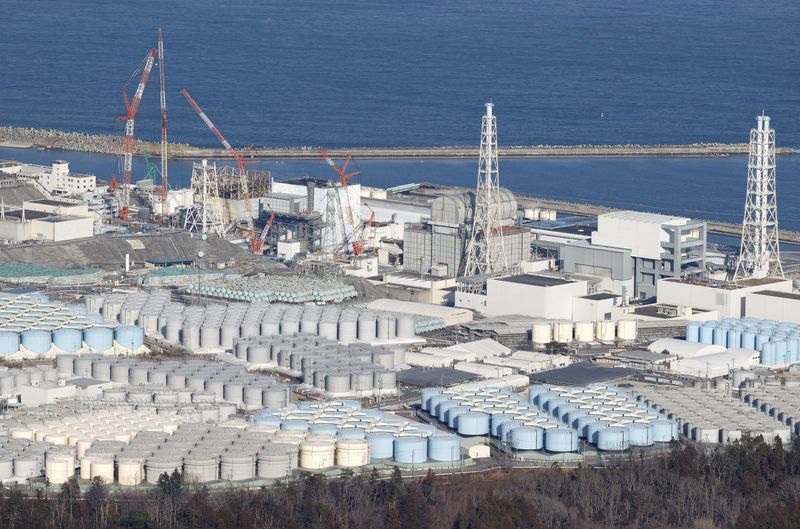By Sakura Murakami and Tom Bateman
TOKYO (Reuters) - Japan said on Tuesday it will start releasing into the sea more than 1 million metric tons of treated radioactive water from the wrecked Fukushima nuclear power plant on Aug. 24, going ahead with a plan heavily criticised by China.
The plan, approved two years ago by the Japanese government as crucial to decommissioning the plant operated by Tokyo Electric Power Company (Tepco), has also faced criticism from local fishing groups fearing reputational damage.
"I expect the water release to start on August 24, weather conditions permitting," Prime Minister Fumio Kishida said.
The announcement comes a day after the government said it had won "a degree of understanding" from the fishing industry over the release of the water into the Pacific Ocean, even as fishing groups said they still feared the reputational damage would ruin their livelihood.
The water will initially be released in smaller portions and with extra checks, with the first discharge totalling 7,800 cubic metres over about 17 days starting Thursday, Tepco said.
That water will contain about 190 becquerels of tritium per litre, below the World Health Organisation drinking water limit of 10,000 becquerels per litre, according to Tepco. A becquerel is a unit of radioactivity.
Japan has said that the water release is safe. The International Atomic Energy Agency (IAEA), the U.N. nuclear watchdog, greenlighted the plan in July, saying that it met international standards and that the impact it would have on people and the environment was "negligible".
About 56% of respondents to a survey conducted by Japanese broadcaster FNN over the weekend said they supported the release, while 37% opposed.
"The IAEA and many other countries have said it's safe, so I believe it is. But fishermen are facing so many problems so the Japanese government needs to do something to convince them," said 77-year-old NGO worker Hiroko Hashimoto.
SCEPTICISM ABROAD
Despite assurances, some neighbouring countries have also expressed scepticism over the safety of the plan, with Beijing the biggest critic.
Chinese foreign ministry spokesperson Wang Wenbin called the move "extremely selfish". He said China was deeply concerned about the decision and had lodged a formal complaint.
Wang said China "will take all necessary measures to protect the marine environment, food safety, and public health," but did not mention any specific measures.
Hong Kong Chief Executive John Lee called the discharge "irresponsible" and said the city would "immediately activate" import controls on Japanese seafood from regions including capital Tokyo and Fukushima starting Thursday.
The ban, which will also be implemented by Macau, would cover live, frozen, refrigerated, dried seafood, as well as sea salt and seaweed.
South Korea said in a statement released Tuesday that it sees no problem with the scientific or technical aspects of the plan, but did not necessarily agree with or support it.
The matter has required President Yoon Suk Yeol to strike a balance as he seeks better relations with Japan while risking consumer backlash at home.
Despite the unease abroad, Kishida said he believed an "accurate understanding" of the matter was spreading in the international community.
Japan says it will remove most radioactive elements from the water except for tritium, a hydrogen isotope that must be diluted because it is difficult to filter.
"Nuclear power plants worldwide have routinely discharged water containing tritium for over 60 years without harm to people or the environment, most at higher levels than the 22 TBq per year planned for Fukushima," Tony Irwin, an honorary associate professor at the Australian National University, said in a note.
A Japanese official said the first test results of the seawater after the discharge may be available at the start of September. Japan will also test fish in the waters near the plant, and make the test results available on the agriculture ministry's website.
(This story has been refiled to correct the spelling of 'tons' in paragraph 1)
